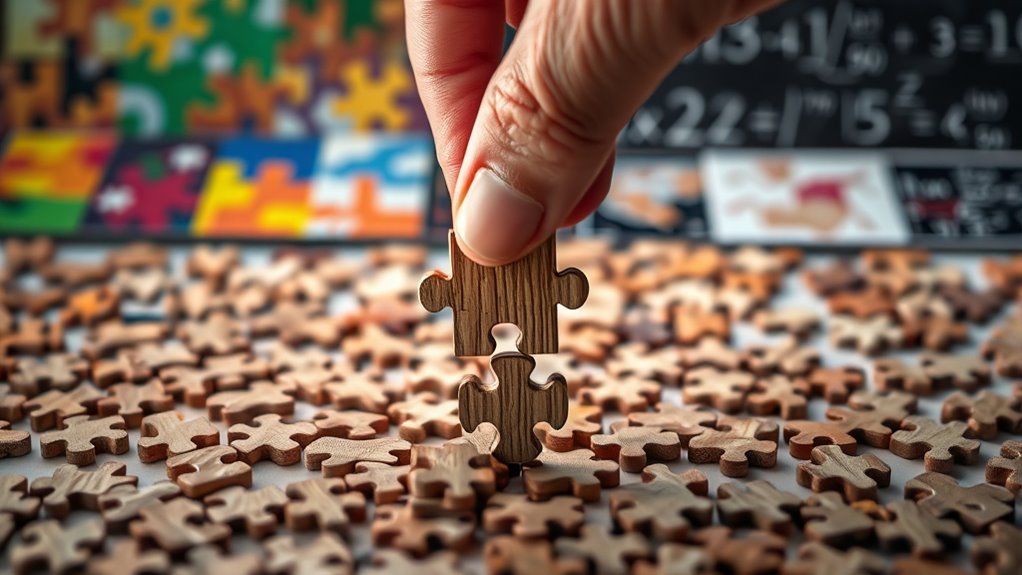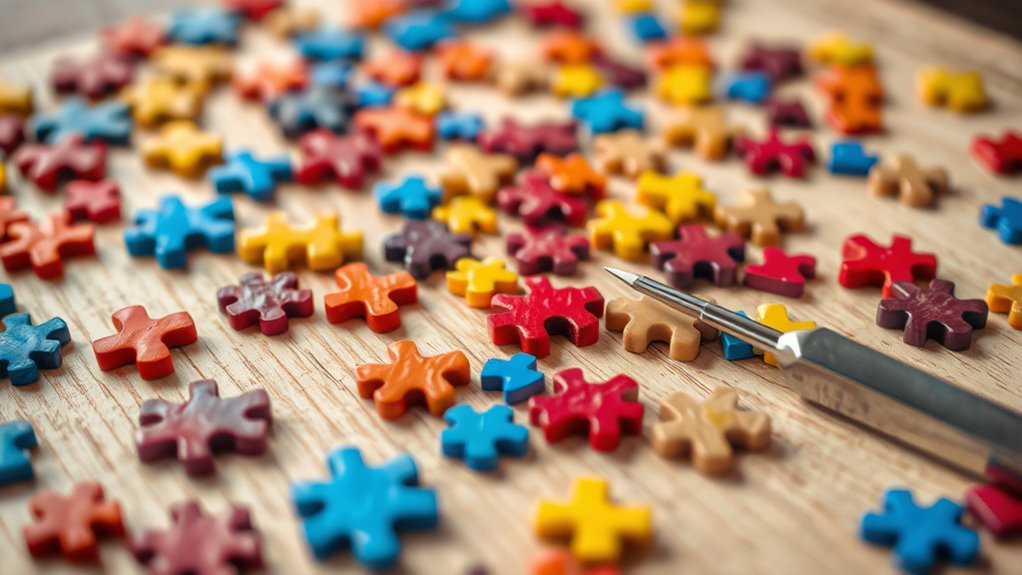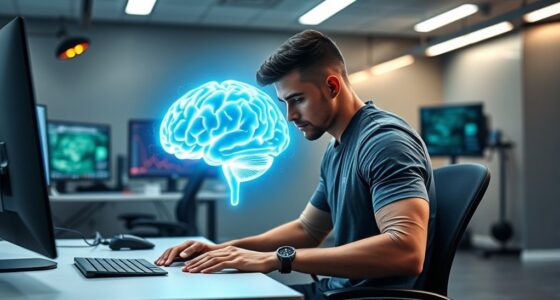When solving puzzles, your decision-making relies on mental shortcuts called heuristics, which help you simplify complex problems and make quick choices. However, cognitive biases like anchoring and confirmation bias can cloud your judgment, causing you to focus on initial ideas or favor familiar strategies. Recognizing these biases and applying effective strategies like breaking down problems or questioning assumptions can greatly improve your problem-solving skills. If you’re curious about how these mental processes influence your puzzle solutions, there’s more to discover ahead.
Key Takeaways
- Decision-making in puzzles relies on mental shortcuts like pattern recognition and trial-and-error to streamline complex problem-solving.
- Cognitive biases, such as anchoring and confirmation bias, can influence choices and lead to suboptimal solutions.
- Familiar heuristics like working backwards or breaking down problems help manage cognitive load and guide focus.
- Recognizing and questioning biases enhances flexibility and opens pathways to more effective strategies.
- Developing awareness of decision-making processes improves puzzle-solving efficiency and reduces errors.

Have you ever wondered what goes on in your mind when you’re solving a puzzle? Your brain doesn’t work randomly; instead, it employs a variety of mental shortcuts known as heuristic strategies. These strategies help you make quick decisions and simplify complex problems, saving you time and effort. For instance, when faced with a challenging puzzle, you might instinctively look for patterns or apply trial-and-error methods you’ve used before. These heuristics are useful because they streamline your thinking process, but they can also lead you astray through cognitive biases—systematic errors in judgment influenced by your beliefs, emotions, or past experiences. Recognizing these biases is vital, as they often cloud your reasoning, making it harder to find the best solution.
When you approach a puzzle, your mind tends to rely on familiar heuristics like “working backwards” or “breaking down the problem.” These shortcuts help you avoid feeling overwhelmed by complexity, guiding you towards manageable parts of the puzzle. However, cognitive biases such as anchoring—fixating on initial information—or confirmation bias—favoring information that confirms your preconceptions—may cause you to overlook better strategies or solutions. For example, if you initially think a certain approach is correct, you might ignore evidence that suggests otherwise, leading to dead ends. Understanding these biases enables you to question your assumptions and consider alternative paths, which is essential for effective problem-solving. Additionally, being aware of vetted strategies and tools can help you develop more effective approaches to solving puzzles.
Frequently Asked Questions
How Do Emotions Influence Puzzle-Solving Decisions?
When you’re solving puzzles, your emotions play a big role in your decisions. Emotional regulation helps you stay focused and avoid frustration, making better choices. Mood congruence means your current mood influences how you approach challenges; a positive mood can boost creativity, while negative feelings might lead to impulsive or less effective decisions. Recognizing these emotional effects allows you to manage your feelings and improve your puzzle-solving strategies.
Can Decision Fatigue Affect Puzzle-Solving Performance?
Decision fatigue can profoundly affect your puzzle-solving performance. When your mental stamina dips due to decision overload, you’re likely to make poorer choices, get stuck more easily, or give up sooner. As your mental energy depletes, your ability to analyze and strategize decreases, making it harder to find solutions. To stay sharp, take breaks and manage your decision load, so your cognitive resources aren’t drained too quickly.
What Role Does Intuition Play in Solving Complex Puzzles?
Intuition plays a vital role in solving complex puzzles by leveraging heuristic shortcuts and pattern recognition. You often rely on your gut feeling to quickly identify likely solutions, saving time and mental effort. This subconscious process helps you spot familiar patterns and make educated guesses. By trusting your intuition, you can navigate tricky parts more efficiently, especially when logical analysis becomes overwhelming or stalls.
How Does Prior Experience Impact Decision-Making in Puzzles?
Your prior experience shapes how you approach puzzles by influencing your decision-making. You rely on heuristic shortcuts and pattern recognition to quickly identify solutions based on past successes. This can make solving easier, but sometimes it leads you astray if the puzzle’s pattern differs. Your familiarity helps you decide faster, yet it’s important to stay open-minded to avoid biases from previous experiences.
Are There Cognitive Biases That Hinder Puzzle-Solving Accuracy?
Think of your mind as a maze, where cognitive biases are dead ends. These biases, like heuristic shortcuts, often lead you astray, causing you to overlook better solutions. They distort risk assessment, making you overconfident or overly cautious. Recognizing these biases helps you navigate puzzles more accurately, avoiding pitfalls that hinder your progress. Being aware of them allows you to approach each challenge with clearer judgment and better decision-making skills.
Conclusion
So, next time you’re stuck on a puzzle, remember that your decision-making skills are basically a superhero in disguise—if that hero occasionally forgets where they put their glasses. Embrace your quirks, trust your gut (or random guesses), and celebrate every tiny victory. After all, the real puzzle is figuring out how you survived this long without losing your mind. Happy solving—may your choices be as clever as your snack choices during marathon puzzle sessions!









